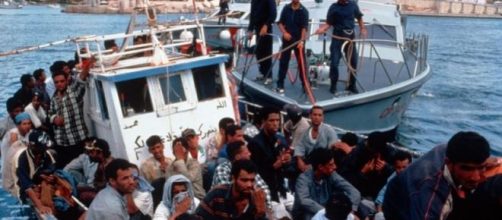A migrant ship coming from Libya capsized in the Sicilian Canal on Tuesday as it was trying to reach Europe. A tugboat standing by the petrol platforms in Libya notified the accident allowing for a coastguard ship to come to the rescue. The boat was already transporting 318 migrants that it had saved only a little earlier. 121 migrants were rescued and the tugboat's personnel helped to patrol the zone in order to find other survivors.
In under 24 hours, no less than 7 rescue missions were launched by the Italian coast guard ships, saving a total of 941 in the Sicilian Canal that paves the way between North Africa and Sicily.
The amplitude of these rescue missions is more and more alarming.
The number of migrants crossing the Mediterranean on the rise: In 2014, over 165 000 migrants disembarked in Italy. According to the Italian Ministry of Interior, 7 882 migrants have arrived on the Italian coasts in the sole months of January and February 2015, which is a 43% increase comparing to last year's numbers for the same time period.
Most of the migrants concerned are Sub-Saharan Africans, hoping to find a better future in Europe. They travel the route Eritrea and Libya before embarking on boats that supposedly take them to Italy. However, human smuggling networks have never been as developed as they prosper on Libya's failure to control its borders.
Human trafficking and migrant smuggling has taken a new horrific turn in 2014 with the apparition of "ghost ships": hundreds of migrants are forced onto cargo vessels with no crew to guide the ship, sometimes in stormy weather. The boats can only be saved if the migrants themselves are able to operate its radio or found by another ship at sea. This profit-maximizing phenomena - smugglers make up to $1 million per trip- is putting migrants' lives even more at risk than before, making the Mediterranean the most lethal route in the world with approximately 3 500 deaths at sea for the year 2014.
A little European solidarity? Italy, the first EU country concerned, is completely overwhelmed by the arrival of these migrants: at the end of February, over 67 000 people were hosted in its already-packed refugee centers.
The country regularly calls the EU for more solidarity.
Due to a lack of funds, its rescue mission Mare Noestrum was replaced by the Triton operation led by Frontex in November 2014. It aims more at securing Italian borders than saving migrants at sea. In the light of the circumstances however, Italian authorities still have to lead many rescue missions.
It is grand time for other EU Member States to take action in solidarity for these migrants, and against human smuggling networks.

